‘I want you to suffer with me’: What drives people to torture, enslave someone at home?
They could have sadistic tendencies and a sense of entitlement. But violence escalates ‘primarily because there’s no consequence’, an expert believes. CNA Insider gains insight into the psyche of serial abusers.
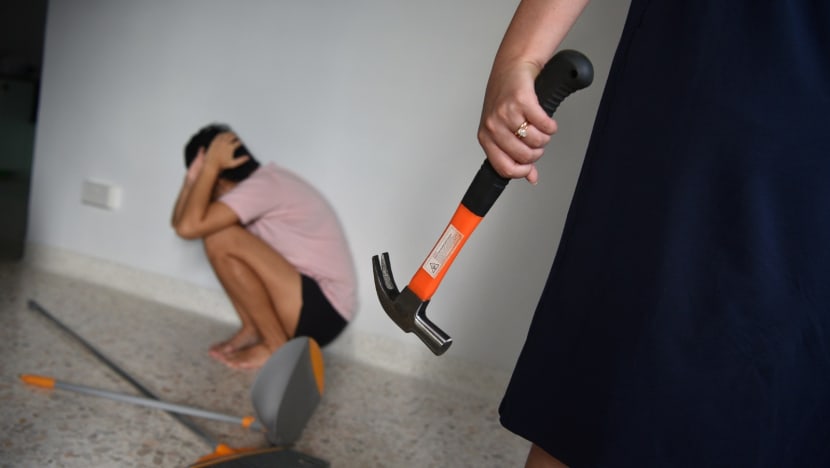
Extreme abusers dehumanise their victims. (Posed photo: Jeremy Long)
SINGAPORE: It started with regular insults about Beth (not her real name) and her family back in the Philippines.
Soon afterwards, her employer became more controlling and allegedly took away Beth’s passport, phones and ATM card, telling her to keep only some of her clothes for daily use. The rest were packed away to a storage facility.
After the employer raised her palm threateningly a few times, the physical abuse began for real.
Over several months from February 2019, she allegedly hit Beth on the head, on the wrist, on the back with a bottle of cleaning solution and on the side of her head with an empty bottle.
Beth, now 36, said she was often alone with her employer as the other family members were out for long hours.
“I was scared to talk with her,” said the domestic worker. “Maybe if you ask why (she took away my phones), she might get angry. She was always in (a bad) temper.”
Her employer threatened to send her back and get her blacklisted if she told anyone about the abuse, she claimed. “When she first started scolding me, I kept quiet. I thought maybe she was stressed. But she continued.”
When the beating started, Beth said she still kept quiet. “I was scared to argue with her because she has a heart problem,” she said. “I felt like I was inside a jail, but I couldn’t do anything … I have my (14-year-old) son to support.”
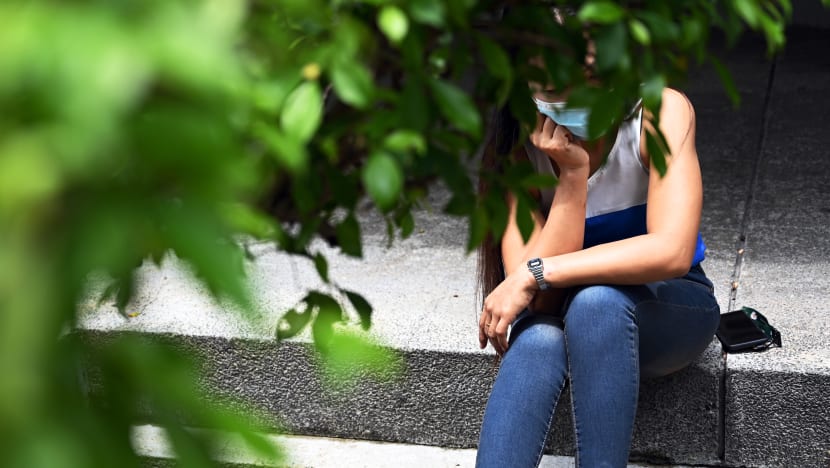
She added: “If she had a problem, she could (have talked) to me so I could’ve adjusted … But she never said anything. She got angry and beat (me).”
Beth said she asked her “madam” twice about changing employers. The first time, she backed off when her employer began to get angry. The second time, the employer allegedly said, “I want you to suffer with me.”
In September 2019, her employer grabbed her head and pushed her face close to a hot pan on a lit stove for rolling a lump of dough too thinly. That was the last straw, according to Beth, whose version of events could not be verified independently.
After seeking advice from advocacy group Humanitarian Organisation for Migration Economics (Home), she ran away a few days later when she had the chance. “I felt like if I didn’t run away today, what would be the next thing that she’d do? Maybe worse than that,” she said.
While Beth managed to escape before suffering serious harm, there are victims who did not.
Recent cases of extreme abuse of non-family members have shocked the public and sparked calls for greater protection for vulnerable groups, including domestic helpers.
The government has said it is reviewing three areas to ensure that cases like the torture and death of Myanmar national Piang Ngaih Don do not happen again.

The review includes the way doctors report their medical examinations of domestic workers, how community and partner organisations can better identify signs of distress in maids, and the safeguards against abusive employers.
READ: Woman admits killing maid; starved her to 24kg and assaulted her almost daily in 'utterly inhumane' case
READ: Myanmar maid's death: MOM reviewing how doctors report potential abuse
Court proceedings for Piang’s case — and another concerning a woman with intellectual disabilities who was treated as a slave and tortured by the family she was living with — are ongoing. In 2017, a couple who tortured their tenant, who died, were sentenced to 14 and 16.5 years in jail.
What drives abusers to inflict such a degree of harm? There are many factors involved, and experts say not every case follows the same pattern. Aggressors may have a misplaced sense of superiority over their victims that leads them to view their targets as less human.
They may have sadistic tendencies. Starting with degrading names and verbal abuse, they create an environment ripe for violence, which escalates when they do not get caught.
‘A TINDERBOX’
Before physical abuse begins, perpetrators may try to coerce and dominate the victim, said forensic psychiatrist Jaydip Sarkar.
They may take away the victims’ freedom and isolate them from others — by taking away their phone or passport, telling the victims what to wear and not allowing them to leave the house on their own. They may deprive victims of adequate food, rest and medical care.

Abusers tend to “mercilessly” target real or imagined vulnerabilities by, for example, accusing their victims of being dirty, smelly or of overeating, said Dr Jaydip, who was previously with Singapore’s Institute of Mental Health and is now based in Melbourne. He specialises in assessing and managing female victims and perpetrators.
Abusers may track their victims’ whereabouts in the house. “I know of an extreme case where the employer got the feed from the CCTV through an app installed in her handphone, and tracked every movement of the maid,” he said.
Such employers who “become totally preoccupied (with) their maids and what they’re doing” are the riskiest. “They’re obsessed with cleanliness and often drive their workers to extremes, punishing them for evidence of poor standards of cleanliness.”
READ: Jail for woman who asked maid to punch herself and strike her teeth with meat pounder
These actions start to break down the victim emotionally and create an “enabling environment” for violence to occur, said Dr Jaydip. “It’s like a tinderbox, where now any little thing that the (victim) does wrong can lead to violence.”
WHEN VIOLENCE ESCALATES
A one-off act of abuse may be due to miscommunication, the abuser taking out frustration on a convenient target, or “plain nastiness”, said senior consultant Kenneth Koh from the IMH’s department of forensic psychiatry.
Sometimes people with mental disorders like depression have less control of their impulses, and aggressors may magnify their victims’ mistakes, he said. For instance, they may pinch or throw items at victims for burning food while cooking, or leaving the tap running.
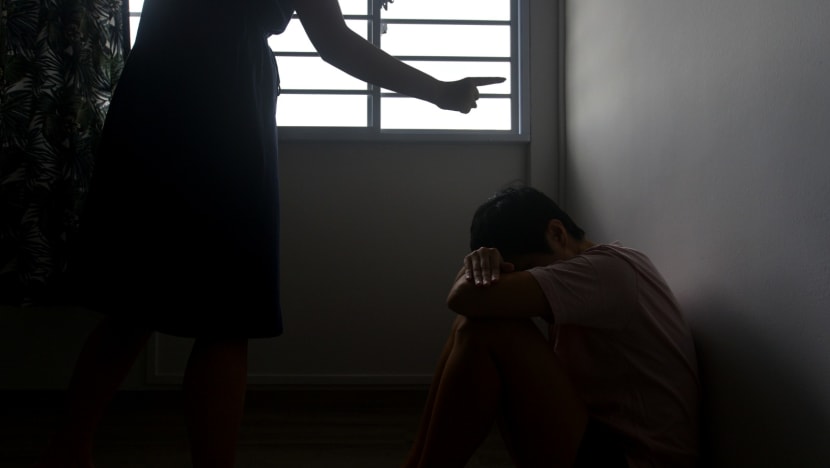
Where the abuse is repetitive and severe, even if the abuser has a mental disorder, there is often an underlying character flaw.
“For instance, they may have sadistic tendencies and consider foreign domestic workers to be their ‘property’ whom they have ‘ownership’ of and whom they can thus treat inhumanely,” cited Dr Koh.
Abusers may find that punishment brings “benefits” in the form of the victim working faster or better out of fear, said Dr Jaydip. This reinforces the abuser’s behaviour and may lead to more sustained and severe violence. “It escalates primarily because there’s no consequence,” he said.
A sense of entitlement allows abusers to feel superior to their victims, not only financially and socially but also morally, said Dr Jaydip.
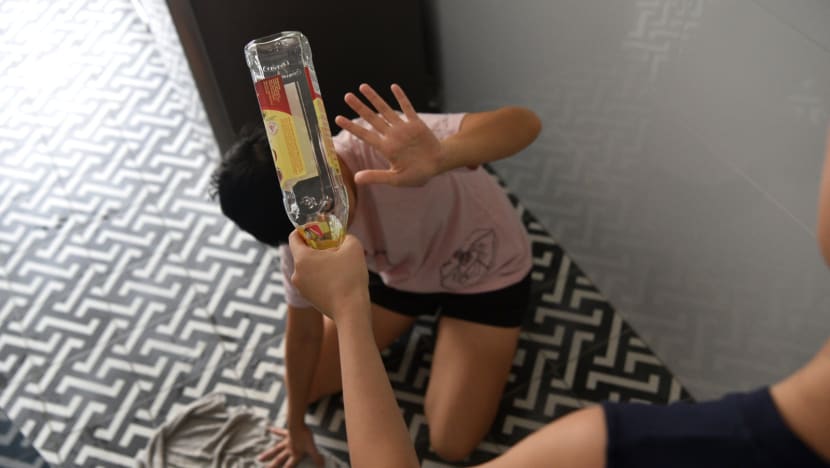
“Think of how the Nazis called the Jews ‘vermin’, rats. The minority Tutsis in Rwanda were called ‘cockroaches’ by the majority Hutus. Such dehumanising language and perceptions allow excessive violence to occur,” he said.
Perpetrators feel powerful and in control of their problems by displacing all their dissatisfactions onto their victims, said Dr Jaydip. They de-stress and become hooked on violence.
“One perpetrator told me that she felt a sense of relief and calm after an episode of intense shouting and beating her, by then, dying maid,” he said.
When abusers go to extremes such as shackling their victims or making them eat food thrown on the floor, they want the victims to feel the humiliation of living in squalor like animals, said Dr Jaydip.
So while such serious abusers tend to dehumanise the victim, which increases the tendency to violate them more severely, they don’t forget that they’re human.
This seemed to be the case with Pua Hak Chuan and Tan Hui Zhen, the married couple who exploited the late Annie Ee financially and “utterly debased” her, in the words of the prosecution.

They tortured her until she was so weak she urinated on the floor and could not put on a pair of shorts because her buttocks were too swollen and painful from their beatings.
‘MOB MENTALITY’
An aggressor can also manipulate family members to join in the abuse.
Abusers may exploit relationship issues. For instance, a wife who suspects her husband of having a sexual relationship with the victim could force him to prove otherwise by hitting or scolding the victim, said Dr Jaydip.
Perpetrators need to have family on their side so that the abuse can continue, and may use emotional blackmail. Dr Jaydip recalled a woman who threatened to kill herself and her children when other family members tried to stop her.
“Whoever visited the household could see that the maid could barely walk, but no one had the courage to say anything to her because she’d threaten to commit suicide,” he said.
People with abusive childhoods sometimes end up forming a family unit together, IMH’s Dr Koh said. Their childhood experience causes them to normalise the use of violence as adults. And when they experience greater stress than they can cope with, they may take it out on their domestic helpers.
When several family members join in, it is a mob mentality or groupthink, he said — where individuals “behave in ways that they might not have as individuals, but as a group, they reinforce each other’s ways of thinking and behaviours as justifiable”.
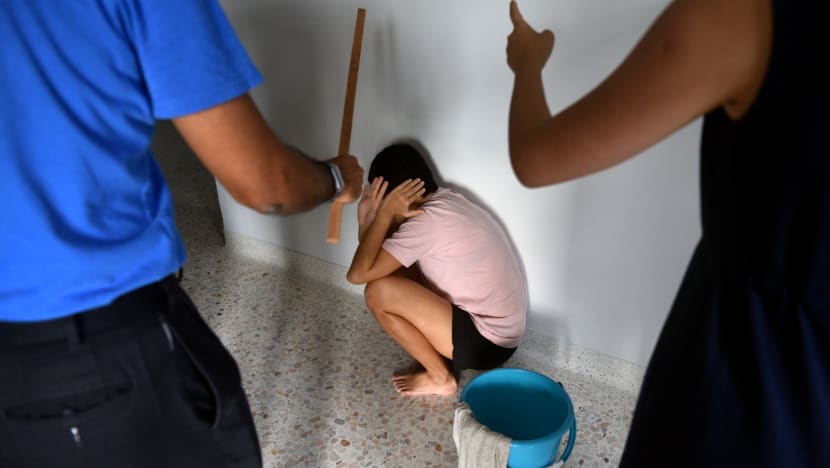
IS MENTAL ILLNESS A FACTOR?
In Singapore, abusers have been known to suffer from depression, obsessive compulsive disorder and other mental conditions. But how often is mental illness a factor in extreme violence?
“Very, very rarely,” said Dr Jaydip. “It’s wrong to believe that one has to be mentally ill in order to be utterly cruel, unkind and violent.”
Unless an individual is seriously mentally ill or experiencing psychotic symptoms — believing, for example, that the maid is a devil who is trying to kill or cause immeasurable harm to the employer or her family — the argument for mental illness being a factor is weak, he added.
Senior consultant psychiatrist Rajesh Jacob of Promises (Winslow) Clinic said findings are inconsistent as to how much mental illness and substance abuse contribute to seriously abusive behaviour.
People who have been violent in the past, however, are more likely to become violent again. And people who regularly abuse alcohol and drugs have a higher risk of violence than others, he said.
There are also those with personality disorders. For example, people with antisocial personality disorder lack the ability to feel remorse and empathy for their victims.
Dr Jacob said they tend to be more violent towards non-family members. And the risk increases if they have psychopathic traits such as enjoyment of violence.
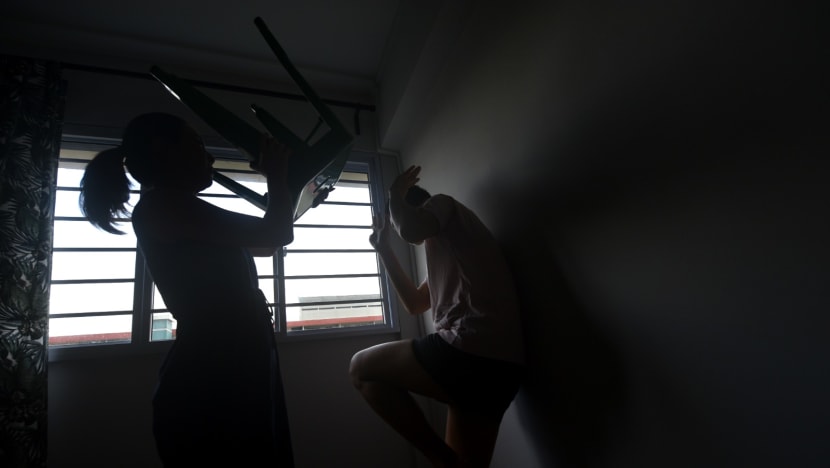
“In these types of cases, the violence tends to escalate over time, especially when the victim is submissive and doesn’t complain and doesn’t have social or family support,” he said.
The violence could also worsen if the aggressors think victims have an “attitude” problem or if their anger at other people, such as their spouse, is displaced to the victim, said Dr Jacob, who is also a prison psychiatrist.
READ: Family treated woman as slave, knocked out teeth, poured hot water and chained her to toilet bowl
His colleague in Promises (Winslow) Clinic, senior forensic psychologist June Fong, noted a point of detail about the recent cases: The number of alleged perpetrators who are women.
Some studies suggest that violent behaviour in women is usually not the result of antisocial personality traits, but rather of conflict with others, delusional beliefs, mood or affective disorders and borderline personality disorder, she said.
The women are also more likely to have a traumatic past, like sexual or emotional abuse or neglect. They tend to target people they know, instead of strangers, she added.
WHAT MORE CAN BE DONE
An average of 270 reports of abuse involving migrant domestic workers were made to the police each year between 2017 and 2020, the Manpower Ministry recently disclosed.
The authorities took enforcement action in 43 per cent of the cases. No further action was needed in 44 per cent of the cases, while investigations are ongoing in the remaining cases, The New Paper reported.
Singapore’s family violence specialist centres — Pave, Care Corner Project Start and Trans Safe Centre — see abuse cases involving non-relatives such as tenants and family friends. But the number is “small”, said the Social and Family Development Ministry.
These centres see “very few” migrant domestic worker cases and would refer them to other appropriate channels, such as the police, embassies or agencies providing dedicated support for migrant workers, the ministry added.
Experts say more can be done to reduce the risk of serious abuse.
To boost the chances of identifying cases early, people should call others out on unreasonable behaviour so that victims are not reliant on only one or two “touchpoints”— such as doctors or employment agents — for intervention, said Ms Fong.
In Beth’s case, she could not approach an employment agency because she had been hired directly from her previous employer.
She said that although her employer spoke nicely to her when friends were around, there was an occasion when she was berated in front of a visitor, who did not speak up for her. “Maybe she was thinking she didn’t know what was happening inside the house,” Beth said.
Voicing concern need not be confrontational, said Ms Fong. “By taking the time to speak with friends, neighbours and peers, we can … set the tone for what constitutes acceptable and unacceptable behaviour towards disadvantaged groups like domestic helpers.”
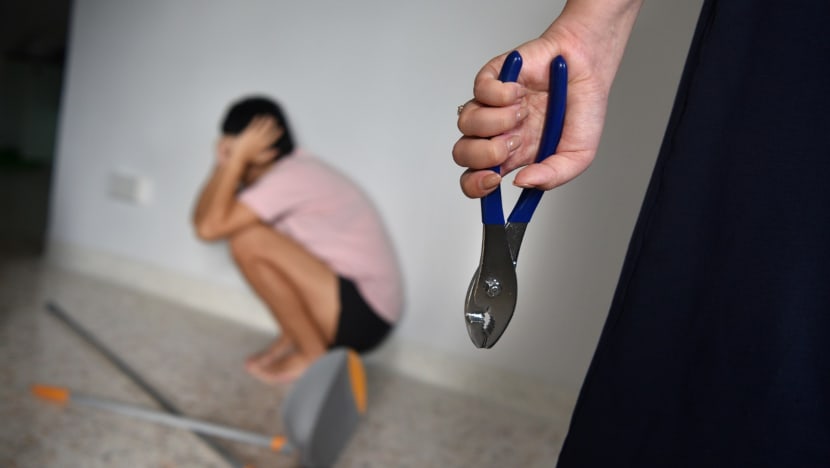
Dr Koh said that during domestic helpers’ six-monthly medical examination, doctors may focus on physical health and omit to ask about their mental health. The workers may be afraid to state outright that they are being abused, especially if the employer is present, he said.
There could be a set of questions about their mental health and overall well-being, perhaps in the form of a checklist, suggested Dr Koh.
Both Dr Jaydip and criminal lawyer Sunil Sudheesan believe employment agencies have a bigger role to play.
“Whilst each case is different, I find that the biggest deterrent for this kind of crimes is knowing you’ll get caught, say, within a week of offending,” said Mr Sudheesan, who has represented such accused persons.
To identify cases early, employment agents could call the workers weekly, and there could be code words for the workers to use if they are being abused, he suggested. But there could be costs involved and increased potential for false complaints, he acknowledged.
“Rather than make the victim call the employment agency about her well-being, we should reverse the roles to make it the duty of the agencies to contact their maids,” agreed Dr Jaydip. “And speak to them in their own language in a sensitive and dignified way.”
Measures should be collaborative, co-ordinated and comprehensive, he stressed. If employment agencies discover risks to the victim, that information should be shared across multiple agencies, which should ensure victims’ removal from danger.
The government could keep a register of abusive employers and those who have committed domestic violence, said Dr Jaydip.

REHABILITATING OFFENDERS
In 2019, the Government enhanced the maximum penalties for all offences in the Penal Code committed against vulnerable individuals by up to twice the prescribed penalties.
READ: Penal Code changes to protect vulnerable victims, minors to kick in on Jan 1, 2020
In prison, violent offenders are offered “broad-based rehabilitation” such as family programmes, skills training and religious counselling, said the Singapore Prison Service (SPS). Some may receive “psychological intervention” conducted by prison psychologists or correctional rehabilitation specialists. This may be one-to-one or in groups.
If needed, violent offenders may be referred to community partners before their release, a spokesperson said. Community partners include social service offices, family service centres, family violence specialist centres and the IMH.
Certain violent offenders are required to undergo the Mandatory Aftercare Scheme upon release. Under the scheme, they are provided with counselling and case management for up to two years to help with issues such as finding employment and accommodation, as well as strengthening family bonds, the SPS said.
Offenders with mental health conditions see medical doctors or psychiatrists when in prison, the spokesperson said. Before release, a multidisciplinary team looks at the offenders’ reintegration needs. The SPS works with the IMH to ensure “necessary aftercare support such as accommodation, continued mental health care and enhanced pro-social support”.
As for Beth, she found an employer who treats her as part of the family. She no longer feels as if she is in jail.
For domestic workers, having days off is important for stress relief and meeting people, she said. It was during a day off that she overheard other Filipinas sharing the contact number of a Home representative who could help abuse victims.

Beth stayed at Home’s shelter for about two months, and the non-governmental organisation confirmed that it helped her to liaise with the police on paperwork allowing her to seek new employment. It also provided counselling and casework support.
Her message to victims of abuse is to be strong and trust in the law. “As long as you’re right, just speak up and don’t be scared,” she said.
To report violence by family or non-family members, call the National Anti-Violence Helpline at 1800-777-0000. If someone’s life is in danger, call 999.












